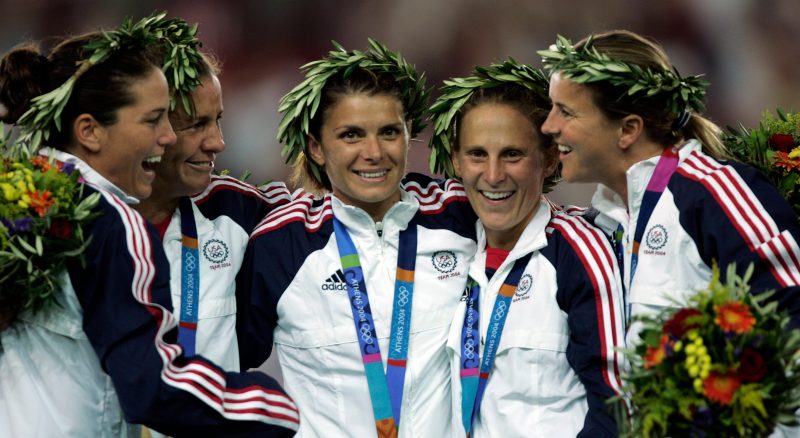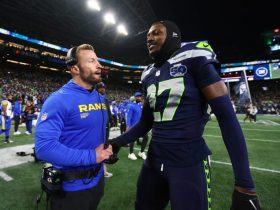Parents should consider if their involvement is taking the joy out of their child’s sports experience.
Families must evaluate if a demanding sports schedule is negatively impacting family dynamics and healthy habits.
Specializing in one sport may increase the chances of a college scholarship but also raises the risk of overuse injuries and burnout.
Steve,
We only let our daughter play one sport per season. No school team for one sport and a club for another.
This was of course to give her time for academics and some down time. Not only down time mentally but I think too many sports at one time takes its toll physically on the body and there is more chance for injury.
I recently talked with our local high school golf coach and he told me his No. 1 player broke his collarbone playing club ice hockey. Maybe it was just a freak thing, but also the overbooking could have had some effect on his game.
But in this day and age maybe overbooking is the way to go? Otherwise the kids will probably just be on their phones anyway.
–Tom
Start by separating yourself from your kids’ sports experience, then answer these questions
Dear Tom,
As a regular reader of my column, you know I am a proponent of kids staying active and trying out as many sports as possible, especially when they are young.
But the moment we watch them step onto the field, the picture can get trickier, especially if we have played sports before.
Izzy! You take that ball, and you runnnn!
Those were the screams of U.S. women’s soccer icon Julie Foudy during her first game with her daughter.
“It came out, and my husband looked at me and he goes, ‘Uh, Paging crazy soccer mom?’” she told her former teammate, Abby Wambach, who was laughing uncontrollably after Foudy’s re-enactment during a recent episode of their new podcast.
“And I was like, ‘Oh my God. I don’t know where that came from,’ ” Foudy said.
As parents, she says, we can unintentionally suck the joy out of our kids’ games by getting too involved. Often when they start out, they meet for an hour or less once or twice a week. Let it be their time to enjoy and discover the sports they truly love.
Finding that separation, and a balance of oversight and fun, is a key to a happy sports family.
Are you allowing your kids to truly enjoy sports?
Foudy credits autonomy within her sport as molding her into a World Cup and Olympic champion. She says her parents rarely came to her games.
To Foudy, their actions weren’t about apathy but about allowing her to own and appreciate her experience. Too extreme? Let’s look at the other side of the coin.
Marv Marinovich, a former NFL strength and conditioning coach, was notoriously hands on.
“Better look up there at least a few times during the game so I can tell you what you need to work on,” Marv would tell Todd from the bleachers.
Todd Marinovich, who has a new memoir out about his soaring football heights and downward spiral out of the game with drug abuse, says his father didn’t push him into football. He was self-motivated, but he admits he would have benefited from his dad hitting the breaks at times.
If we find ourselves interrupting their experience, we can, like Foudy, move to the end of the sidelines, or to the top of the stands, to stay away from the masses.
Wambach, now a soccer mom to a NCAA Division 1 player like Foudy, says we can separate even when our young kids are not playing. If they have two games in one day at, say 10 and 3, and you don’t want to attend the team lunch, allow your son or daughter to go to it with a teammate’s parents.
You keep your peace of mind by sitting on the back deck and reading. Your kid can continue to bond with teammates, which, in my opinion, is the most important benefit of any sport.
Is playing more than one sport interrupting your family dynamics?
The average sports parent spends 3 hours, 23 minutes every day their child has a practice or game engaging in sports-related activities, according to an Aspen Institute national parent survey in partnership with Utah State and Louisiana Tech universities.
According to the survey, 56% of youth sports parents say they eat out for two to four meals per week due to their child’s sports schedule, while slightly more than 1 in 10 families eat out five to seven meals per week due to sports.
Every family can ask themselves: Are you establishing healthy habits and interactions? Are you making time to talk with each other? Are you eating together enough or grabbing too much fast food on the run?
Maybe you love the busy lifestyle and it is ingrained into your family life. Maybe you are overwhelmed, and you need to cut back on the time you invest in sports, and hold off from adding a new one to the mix.
What are your kid’s goals with sports?
About 6-7% of high school athletes (or a little more than 500,000) go on to compete at the NCAA level. There’s nothing wrong with going after those odds. You’ve likely already invested so much time and money into the process by the time your kids reach high school.
But you also have to be realistic. That percentage is cut in half (or lower, depending on the sport) to play Division 1 sports and is microscopic to play professionally.
“I wanted for my son to play football, basketball and baseball because I did,” says former American League MVP Mo Vaughn, who runs a sports academy in Florida and coaches his 13-year-old son, Lee. “But he can’t and be on the major circuit in baseball; he’s gotta work and train doing this all year round, or he’s gonna fall behind. Bo Jackson says nowadays: ‘People that are trying to play two sports, that’s great but you’re gonna be on the bench playing two sports.’
“So number one, the first thing is, let’s not get so caught up in this NIL situation that we forget that young people are still young people and need to grow. And the magic is in the work. And no matter what your status is, you’re gonna have to put in the time to be successful in any sport.”
Vaughn says he checks in with Lee to make sure he is enjoying baseball and the work father is requiring son to do.
Marinovich has had similar conversations with his son, Baron, a budding high school quarterback in Orange County, California. Baron is learning how much training and practice he has to do away from the field to excel at a sport.
“I don’t think people that have never competed at high school or even college know how much time was spent, and there’s just no shortcut there,” Marinovich says. “But if there’s the love behind it, you can spend the time. But there are still those days where I didn’t want to do it, that I just was in a habit of doing it. And the discipline that it taught me because I wouldn’t have spent that time if I wasn’t getting results.
“I’m not talking about just football – (it’s) anything you choose to do.”
Is it worth getting hurt?
Ryan Klesko, another former major league All-Star and advisor for young players via Perfect Game, says he tells athletes to look at themselves in the mirror. If they want to play multiple sports in high school, they need to be OK with another sport ending their competitive baseball career.
“I have seen some injuries happen from players who had a really good chance to go play in college somewhere, get hurt on their secondary sport,” says Klesko, who has coached his son, Hunter, a junior, on the Atlanta Braves scout team.
One in particular, he said, was an elite pitcher who was a high school quarterback. He took a helmet to the shoulder and had reconstructive surgery. Years later, he came to Klesko and said, “Man, I just wish I wouldn’t have played football my senior year, because I was going to get drafted (in MLB).”
All athletes, regardless of skill level, can get into the habit of valuing the intrinsic values of sports – such as developing healthy relationships with lots of people – over the monetary and financial gains we can get from them.
Doing so might help you better shape your focus as you move through high school.
“You know what’s underrated is the club model for sports in college,” says Tom Farrey, who directs Project Play, a national initiative to get more children involved in athletics. “You wear the uniform, you’re representing Cal or Stanford, you’re playing for the rugby team, but you, as students, own the experience more. You might have a coach. If you do, you’re the one that selects the coach. The travel is not to the East Coast for some midweek game that has two stops. It’s more regional.
“I’m struck by this idea of like, ‘Can’t we just build up the college club model and intramural model? Create more participation opportunities, reduce the incentive for parents to try to get their kids into that pipeline and chase these scarce scholarships or preferential admission to selective universities.’ ”
If you’re going for it, are you overtraining?
Specializing in a sport can lead to overuse injuries, which result from cumulative microtrauma to bone, muscle, and/or tendon as a function of repetitive stress with insufficient recovery, according to the American Academy of Pediatrics (AAP).
There can be a psychological component of them, too.
“I always ask all my athletes when they’re coming into the office what their training load is, what is their routine, how much time off do they have over the past 12 months and if they’re still enjoying the sport,” says Joel Brenner, the medical director of the sports medicine program at Children’s Hospital of The King’s Daughters in Norfolk, Virginia.
“There’s times that they say that they’re not really enjoying it and then we have to go into, ‘Well, then why are you doing it?’ ” Brenner says. “And if they are not enjoying it and they’re burned out, then we talk about other possibilities that they could do, like taking a break from the sport, finding a different sport or other activity. Sometimes, especially if they’re burned out or overtraining, just taking a break, having a few months off, can really refresh them both physically and mentally, and maybe they don’t want to get back to that sport but maybe they’ll pick up another sport.”
The AAP recommends one day of complete rest per week and two to three months off from participation in any specific sport to let your body recover. They don’t have to be consecutive months and you can still train and lift weights during that time.
When you’re not playing, where’s your phone?
Marinovich, the former Raiders phenom, says playing basketball in high school made him a much more athletic football player. Wambach says playing the sport growing up and learning how to jump for rebounds helped her with headers in soccer.
If you play only one sport, what else are you doing?
“If your phone time is more than your practice time then don’t complain about your playing time,” says Larissa Mills, who directs the London, Ontario-based Mental Game Academy, which helps athletes develop emotional and social awareness.
Mills, who works with players from the youth through professional levels, says 80% of the athletes the academy sees are in what she calls “yellow.”
“They don’t like themselves,” she tells USA TODAY Sports. “They’re on their phones probably six to nine hours a day, and this is the leading cause of behavioral issues in our society. It’s global. But we go in and show them how phones change their brain, and show them how it really hurts their performance, their speed, their strength, their decision making, and then, bam, they just get off them. …
“Kids need to be bored and go play. Our brains are simply not designed to be on tech. They’re designed to talk and walk, so psychologically, we’re kind of stunting the development.”
Here’s my tip, courtesy of Jeff Nelligan, who has written a book about sports parenting. While raising three boys, who played collegiately at the varsity or club level, Nelligan would take an evening walk with them.
I recently started doing this with one or both of my teenagers and the dog. We don’t bring phones, or we leave them in our pockets.
I don’t say anything when we begin, and, without prompting, they usually just start talking. That dreaded question – “How was your day?” – that rarely gets more than a one-word response is magically answered.
As parents, sometimes we just need to tweak the current dynamics.
Steve Borelli, aka Coach Steve, has been an editor and writer with USA TODAY since 1999. He spent 10 years coaching his two sons’ baseball and basketball teams. He and his wife, Colleen, are now sports parents for two high schoolers. His column is posted weekly. For his past columns, click here.






